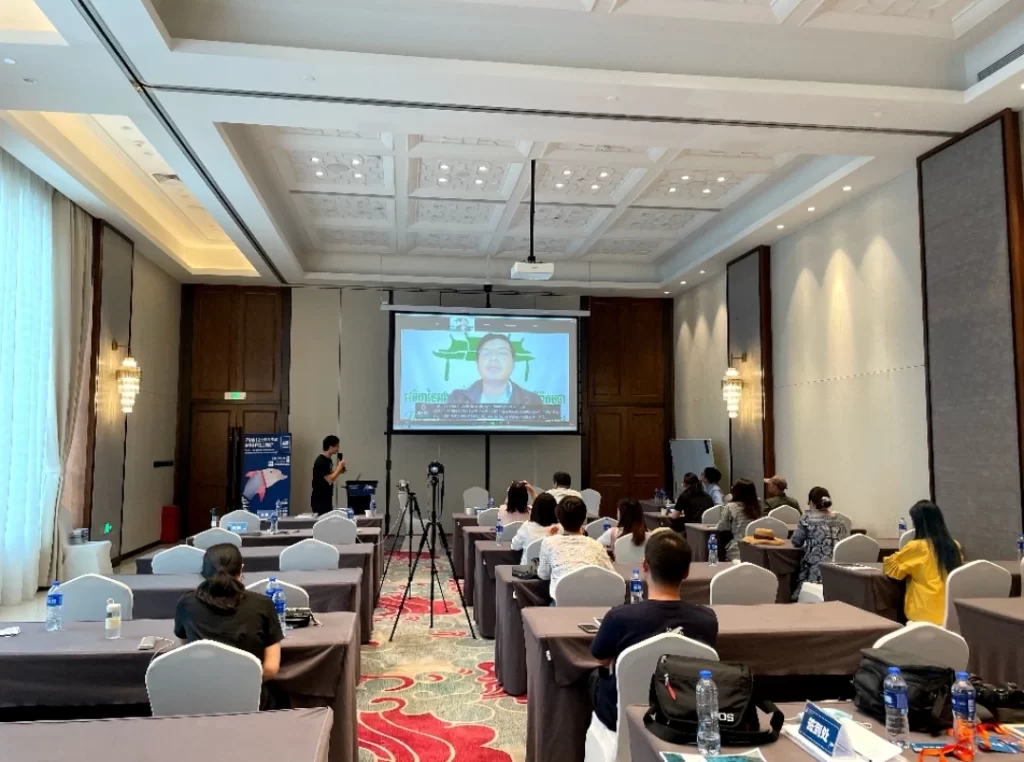By: Diinsider & Pumbaa Eco
On May 22nd, International Biodiversity Day, a seminar on how companies can promote biodiversity mainstreaming was held in Beijing, organized by social innovation consultancy Pumbaa Eco.
At the conference, Pumbaa Eco released the “New Opportunities for Corporate Biodiversity Mainstreaming Report”.
Secretary General Chen Xiaodong of Zhongguancun Zhirong Special Robotics Alliance, Dr. Cheng Chen of Shanshui Nature Conservation Center and Mr. Zhang Yunbo, a biodiversity expert, were invited to the seminar to discuss the best path for companies to promote biodiversity mainstreaming. The NGO guests from Myanmar and Cambodia shared their welcome of China’s active use of new ways to explore biodiversity conservation.

Corporate involvement in biodiversity has natural advantages
Zhang Yunbo, the director of the biodiversity conservation project of Pumbaa Eco, has been working on nature conservation in the front line for a long time. He has promoted the improvement of the protection mechanism of important bird habitats in eight Yellow and Bohai Sea coastal wetland areas, and organized the preparation of several scientific reports and conservation proposals related to rare and endangered bird species and habitats.
Zhang Yunbo released the “New Opportunities for Corporate Biodiversity Mainstreaming Report” on behalf of Pumbaa Eco. It iillustrated the new opportunities for corporate participation in biodiversity conservation by explaining why companies should do biodiversity conservation, what directions they can take, and how much resources they need to invest. According to Zhang Yunbo, enterprises are a bridge that connects the whole social ecosystem and can directly promote the awareness and behavior transformation of various groups, and they have an inherent advantage in biodiversity conservation.
The report points out four levels of corporate participation in biodiversity conservation, namely resource input, independent development, selective participation and industrial transformation, as well as six directions of corporate participation in biodiversity conservation: ecosystem restoration and rehabilitation, rare and endangered species protection, public science and nature education, conservation policy research and advocacy, eco-friendly lifestyles and eco-friendly industrial transformation.
How international companies can contribute to biodiversity conservation in the international arena – with a focus on the Mekong region
How can international companies actively promote international practices in biodiversity conservation? Two NGO guests from Myanmar and Cambodia share their positive suggestions for international companies to get involved.
Nyein Zaw Ko, founder of Nature Advocacy in Myanmar and executive director of the online campaign “Save the Irrawaddy Dolphin”, participated in the workshop online. Nyein, who participated in the workshop online, said that business enterprises are constantly looking for emerging consumer trends to create value for consumers by providing solutions to their problems and needs. He mentioned that China, with its large conglomerates and manufacturing industries, is the biggest force for global environmental protection, and that more than half of the organizations that have signed a pledge to stop the wildlife trade are Chinese social media platforms and companies. Therefore, social media engagement can have a positive impact on biodiversity conservation in Southeast Asia, especially for ecological conservation in the Mekong River Basin. In addition, he pointed out that the Chinese government’s proposal to reach the carbon neutrality target by 2060 is a positive and strong signal that the natural resources of the Mekong River will also be developed and used in a rational way.
Another online participant, Vannara Ouk, is an environmental veteran with over 20 years of experience in policy advocacy, natural resource governance, environment and agriculture, and sustainable development. Vannara Ouk shared his organization’s attempts to protect biodiversity in the Mekong River Basin and made policy recommendations for sustainable development, including adding renewable energy options rather than hydro-power dams in the Mekong River Basin, involving civil society organizations in the entire process of environmental and social impact assessment before starting the investment projects, and establishing a shared information platform to ensure investment information is available to the public, etc.
In terms of suggestions for future work by Chinese companies in the Mekong River Basin, Vannara Ouk suggests that Chinese companies strengthen their communication with Mekong communities and provide necessary livelihood support to community members, while engaging them in an environmental agenda. Chinese internet technology companies can play a more important role in raising awareness of the need to promote biodiversity conservation and protection for sustainable development in the Mekong River Basin.
In mid-April, Pumbaa Eco also invited 50+ investors, entrepreneurs, NGO partners, experts, scholars and representatives from media organizations who are concerned about biodiversity conservation in Shenzhen, to discuss the solutions for biodiversity mainstreaming from companies. After the seminar in Beijing on May 22nd, Pumbaa Eco realized more than ever that corporate participation is the key to mainstreaming biodiversity.
